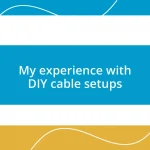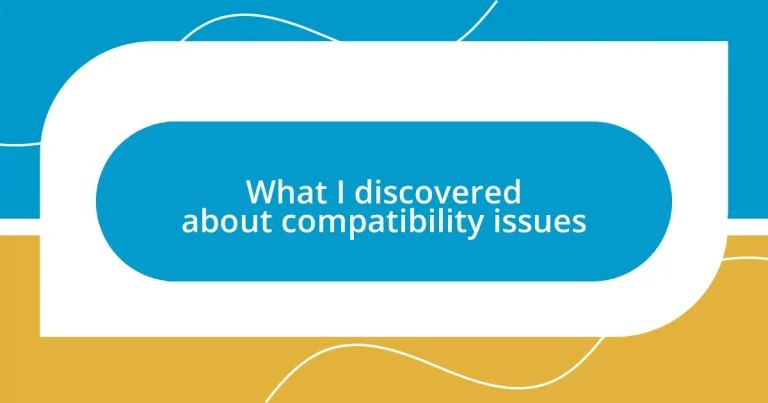Key takeaways:
- Emotional intelligence and communication styles are crucial in assessing compatibility; differing approaches can lead to misunderstandings.
- Factors such as personality differences, social environments, and emotional readiness significantly impact relationship dynamics.
- Open communication, empathy, and external support, like therapy, are essential strategies for resolving compatibility issues and maintaining a healthy relationship.
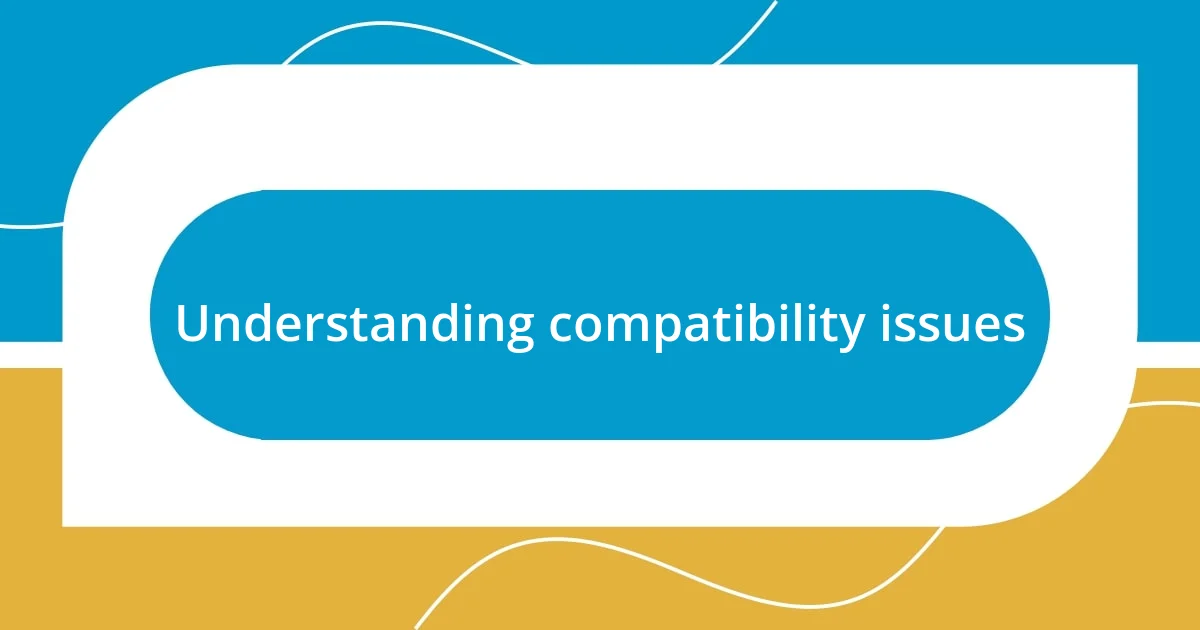
Understanding compatibility issues
Compatibility issues can often feel like a riddle, leaving us puzzled about why two seemingly perfect matches don’t click. I remember a time when I thought a relationship was destined for success, only to realize that our differing values brought uncertainty into our conversations. Have you ever experienced that unsettling disconnect? It’s fascinating, isn’t it, how shared interests don’t always translate to deeper compatibility?
Emotional intelligence plays a crucial role here. I once knew a couple who bonded over their love for adventure, yet they struggled when it came to communication during tough times. It’s like having all the right puzzle pieces but still being unable to complete the picture. Isn’t it interesting how emotional awareness can either bridge gaps or widen them?
Another layer to consider is timing—life circumstances can shift our compatibility unexpectedly. I recall a friend who found her perfect match at the wrong moment; their career paths were on opposite trajectories, leading to a bittersweet ending. How often do our lives create obstacles that prevent connections from flourishing? Understanding these nuances can be essential in navigating our relationships more thoughtfully.
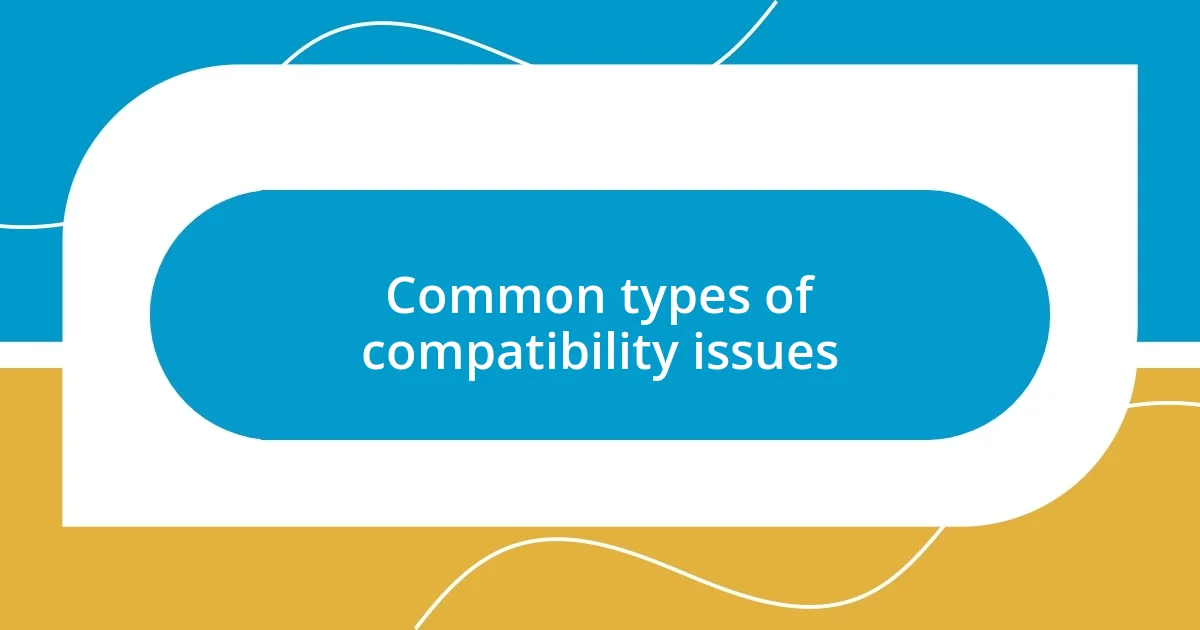
Common types of compatibility issues
One common type of compatibility issue arises from differing communication styles. I once dated someone who preferred to process feelings quietly, while I needed to share my thoughts openly. This difference led to misunderstandings, leaving us feeling more isolated than connected. It’s like trying to speak two different languages—no matter how hard we tried, we just couldn’t seem to understand each other fully.
Another prevalent issue involves conflicting life goals. For instance, a close friend of mine was deeply committed to her career, while her partner envisioned a family-centric future. Their visions clashed so intensely that even the happiest times together felt marred by underlying tension. Here are some common compatibility issues I’ve seen:
- Communication Styles: Variations in openness and feedback.
- Life Goals: Divergence in aspirations like career ambitions versus personal relationships.
- Values and Principles: Differences in fundamental beliefs affecting daily interactions.
- Emotional Intelligence: Disparities in processing and managing emotions.
- Lifestyle Choices: Conflicting preferences in daily routines, finances, or social activities.
Navigating these challenges requires understanding and patience, as they can significantly influence the health of a relationship.
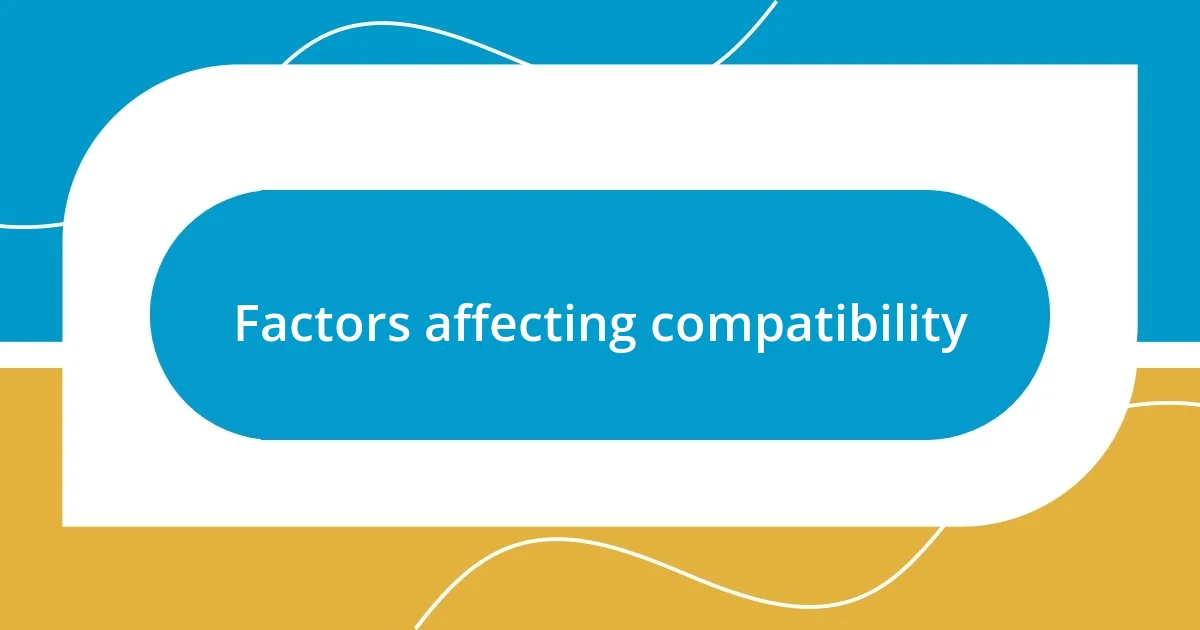
Factors affecting compatibility
Factors affecting compatibility can often be traced back to fundamental differences in personality. I remember a particular friend whose upbeat, spontaneous nature clashed with her partner’s meticulous and planned approach to life. This contrast not only led to disagreements about weekend plans but also raised larger questions about how each valued flexibility versus structure. Have you ever found yourself in a similar situation, where the very traits that attract us to someone can also drive us apart?
Another critical aspect to consider is our social environments. For instance, I once met a couple whose backgrounds shaped their views on family and relationships dramatically. One partner came from a large, close-knit family that celebrated every occasion, while the other had a more reserved upbringing. These contrasting expectations inevitably created friction over time. Isn’t it fascinating how our personal histories mold our compatibility in ways we might not anticipate?
Then there’s the factor of emotional readiness. I encountered this with a colleague who was excited about dating, yet often felt overwhelmed by past experiences. His desire for connection was strong, but he struggled to fully engage due to unresolved issues from previous relationships. Such emotional baggage can weigh heavily on new connections, making it essential to check in with ourselves and our readiness for intimacy. Isn’t it incredible how our individual journeys impact our ability to connect with others?
| Factor | Description |
|---|---|
| Personality Differences | Clashes in traits can create friction in expectations and daily interactions. |
| Social Environments | Backgrounds influence relationship dynamics and conflict over values. |
| Emotional Readiness | Unresolved feelings from past experiences can hinder new relationships. |
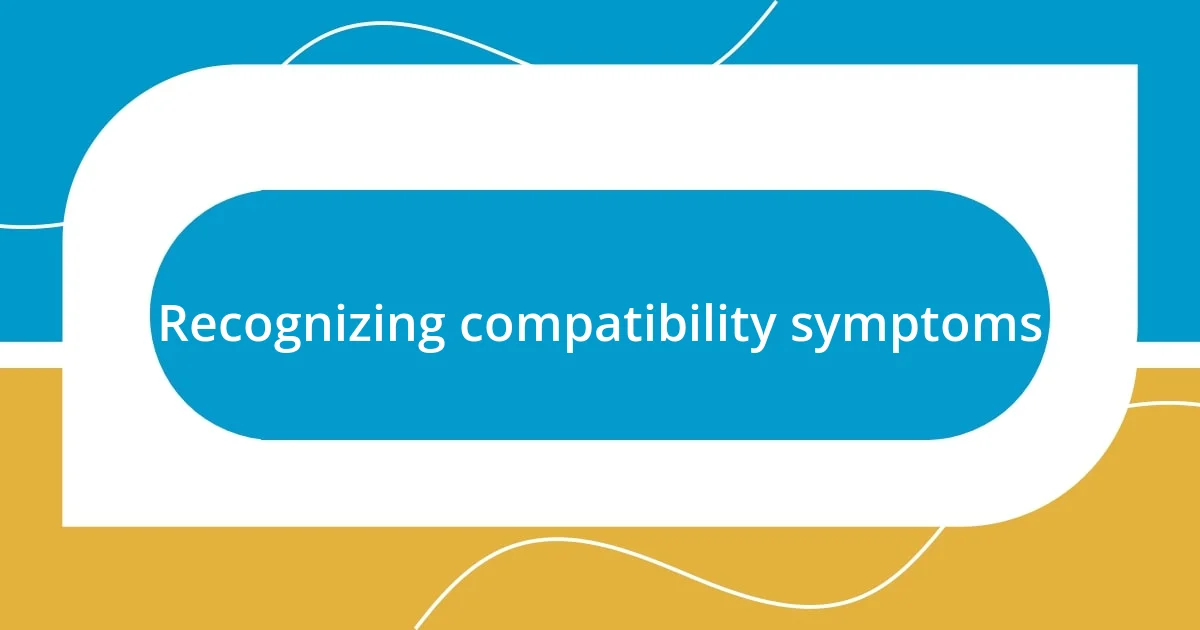
Recognizing compatibility symptoms
Recognizing compatibility symptoms often involves tuning into how you feel during daily interactions. When I was in a relationship that felt increasingly strained, I noticed that even small disagreements left me emotionally drained. I often wondered, “Why does this feel so heavy?” It was like we were both pulling in opposite directions without realizing it. If you find yourself reflecting on these feelings, it might be time to assess the underlying compatibility issues at play.
Another indicator can be the frequency of misunderstandings. I recall a time when I and a partner just couldn’t synchronize our responses to each other’s jokes. What I found funny seemed to fall flat for them, while their idea of humor left me puzzled. These moments weren’t just about laughter—they revealed deeper differences in our communication styles, making me question if we truly resonated with one another. Have you ever experienced that disconnect where you feel you’re on different wavelengths? It’s a clear sign that something fundamental may be amiss.
Sometimes, physical responses can hint at compatibility issues too. I vividly remember moments when I’d feel a knot in my stomach during discussions about future plans with a past partner. Instead of excitement, I felt apprehension. This visceral reaction opened my eyes to the reality that our paths were misaligned. When I realized my body was signaling discomfort, I knew it was essential to confront these feelings. Have you ever felt that physical unease in a relationship? Trusting those instincts can lead to important conversations about compatibility.
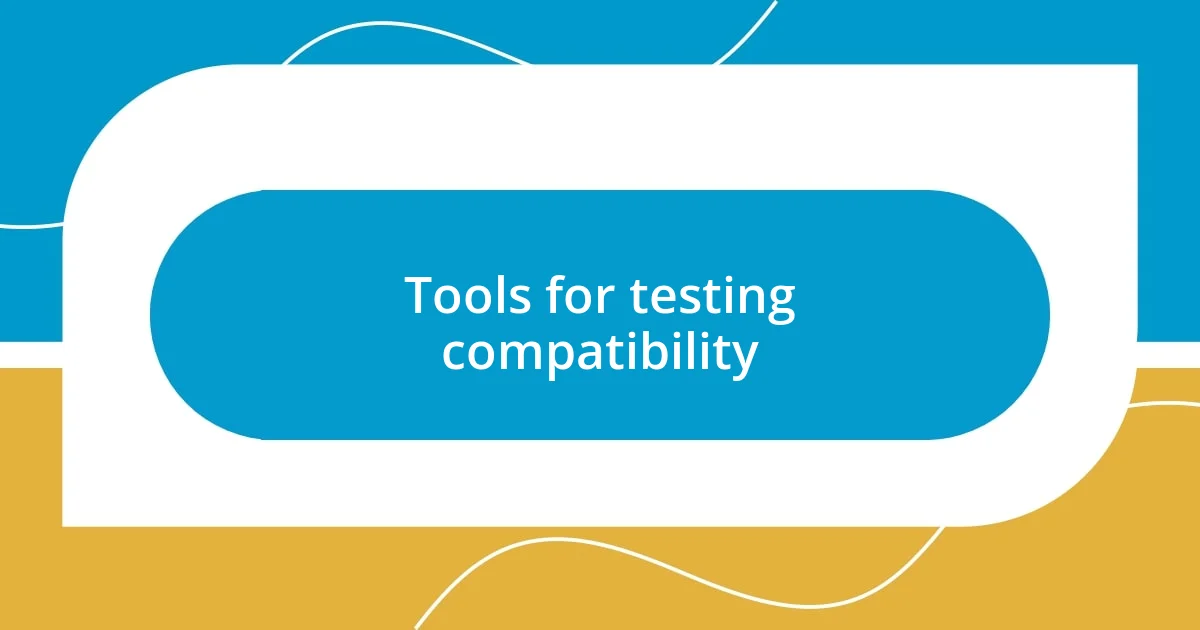
Tools for testing compatibility
When it comes to testing compatibility, several tools can help illuminate the underlying dynamics of a relationship. For instance, personality tests like the Myers-Briggs Type Indicator (MBTI) can provide valuable insights into how differing personalities might mesh. I remember taking the MBTI with a partner and being surprised at how our different types highlighted not just our strengths but also our potential friction points. Have you ever considered using a test like this to deepen your understanding of your relationship dynamics?
An interesting approach I found effective is the use of relationship assessments, which often include various quizzes and questionnaires. They ask key questions about values, priorities, and communication styles. I once participated in such an assessment with a friend who was navigating a tricky phase in her relationship. It helped her see that they shared many core values but struggled with communication—an awareness that sparked an open dialogue leading to positive change. Have you ever looked into such assessments, and what insights did they provide in your experience?
Another valuable tool is seeking feedback from trusted family or friends. I once had a close friend who felt uncertain about her partner’s compatibility with her values. After some candid conversations with her family, it became evident that they shared concerns about future goals and lifestyle choices. This outside perspective offered a fresh lens through which she could reevaluate her relationship. It’s sometimes challenging to see the forest for the trees, isn’t it? Engaging others can bring clarity and help identify compatibility gaps that might not be immediately apparent.
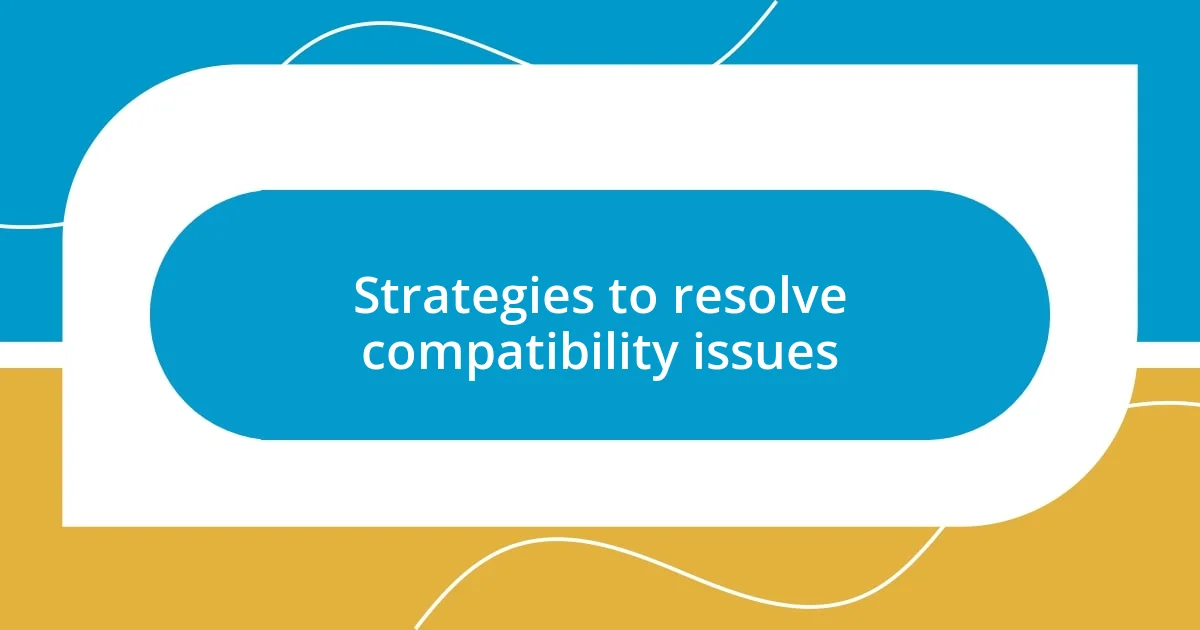
Strategies to resolve compatibility issues
One effective strategy for resolving compatibility issues is to engage in open and honest communication. I remember a time when my partner and I hit a rough patch, and instead of shying away from tough talks, we committed to weekly check-ins. These moments of vulnerability not only strengthened our bond but also shed light on underlying concerns we might have otherwise ignored. Have you ever tried setting aside time for candid conversations? It can open the door to deeper understanding.
Another approach I found particularly useful is practicing empathy. When conflicts arose, I started to put myself in my partner’s shoes, trying to grasp their perspective fully. There was a moment when I felt dismissed during a disagreement, but I chose to listen actively and ask clarifying questions instead of just reacting. This small shift changed the tone of our arguments, fostering a space where both of us felt valued and heard. How often do you find yourself truly connecting with the other person’s feelings in such instances?
Lastly, seeking external support—like couples therapy—can provide valuable tools for navigating compatibility challenges. I once went to a therapist with a partner, not because we were at a breaking point, but to enhance our understanding of each other. Through guided discussions, we unearthed unexpressed feelings and desires that bridged gaps I didn’t realize existed. It’s a proactive choice, isn’t it? Investing in support like this shows that you value the relationship and are committed to its growth.
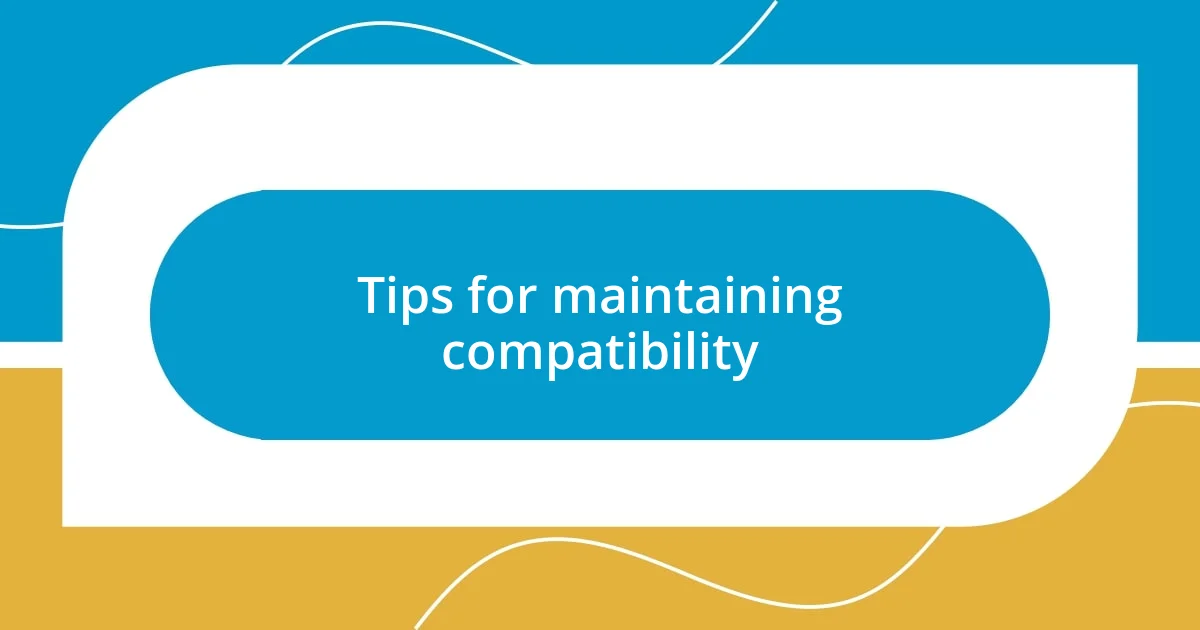
Tips for maintaining compatibility
When it comes to maintaining compatibility, setting aside regular time for fun and shared experiences can be a game-changer. I recall planning spontaneous weekend getaways with my partner, which reignited our connection and revealed new facets of each other’s personalities. Have you thought about how a simple adventure can create memories that strengthen your bond?
Another tip I swear by is practicing gratitude within the relationship. A few years ago, I started a small ritual of sharing what I appreciated about my partner each night before bed. This practice not only highlighted the positives between us but also fostered a climate of appreciation that made it easier to navigate our differences. When was the last time you expressed genuine gratitude in your relationship?
Additionally, being mindful of each other’s individual growth is crucial for compatibility. I’ve experienced how supporting personal goals can enhance the relationship dynamic. For instance, when my partner took up a new hobby, I chose to cheer them on and even join in occasionally. This not only brought us closer but helped me understand them better. How do you ensure both yourself and your partner continue to grow while remaining connected?
